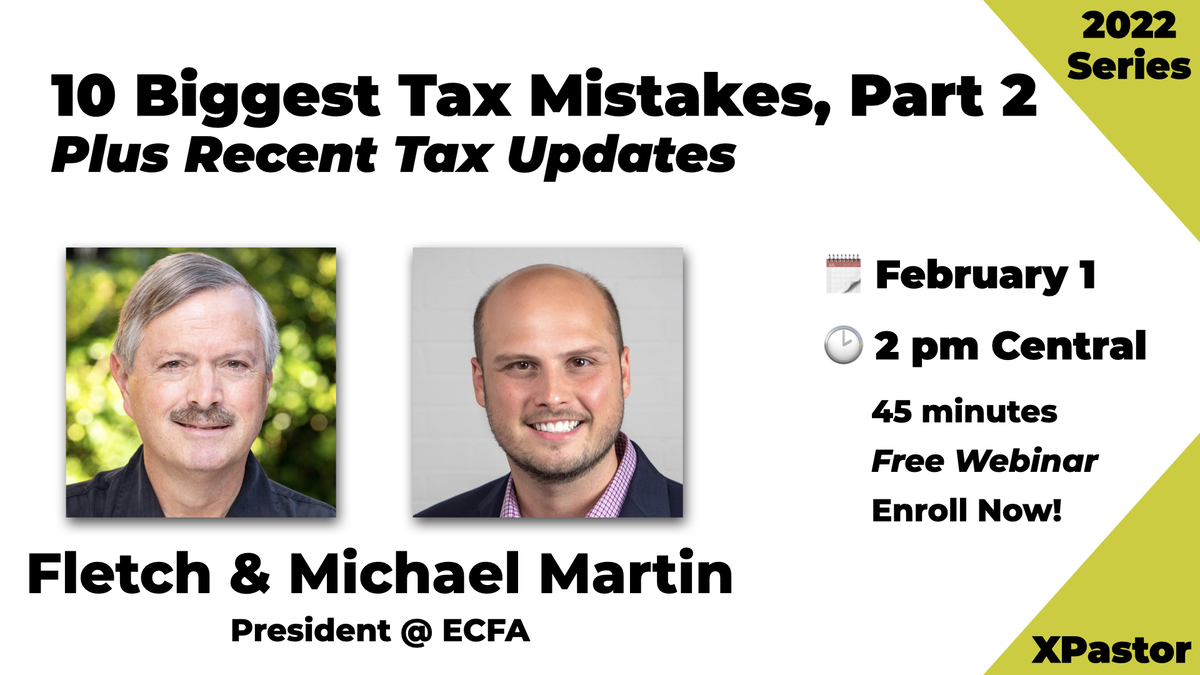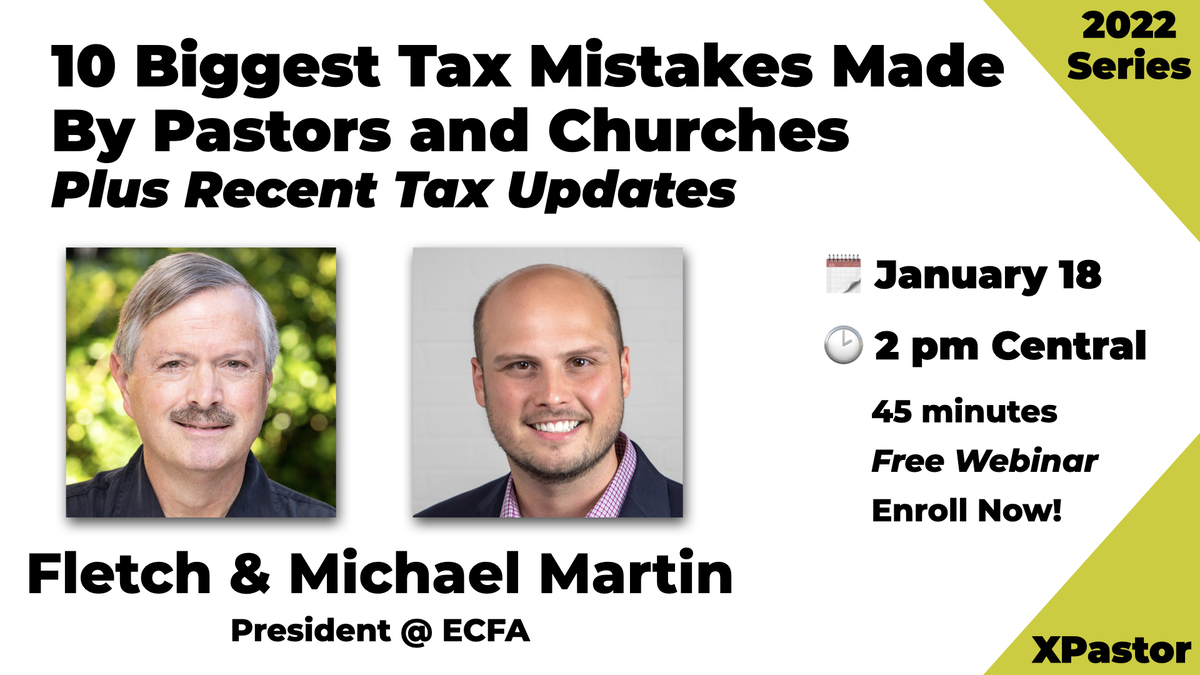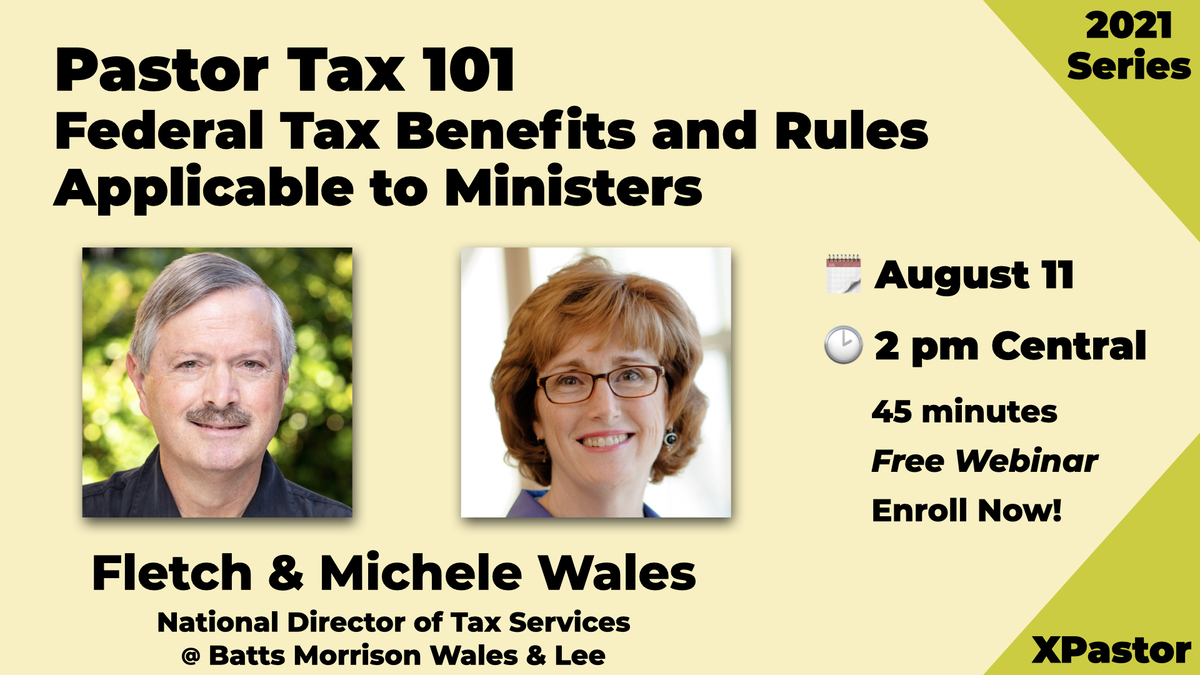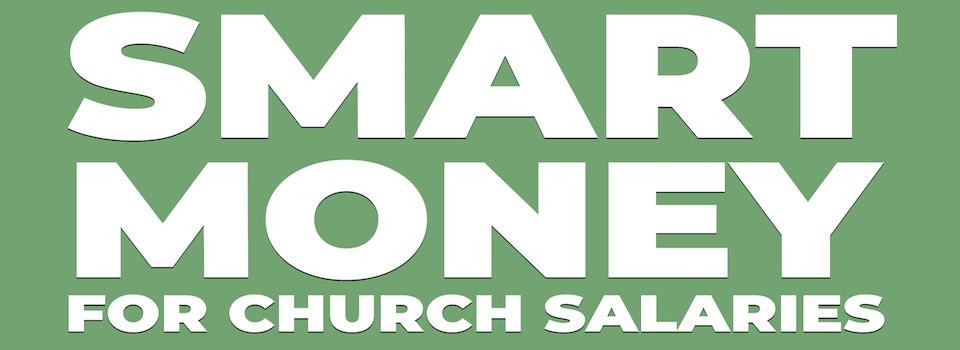Determining who qualifies as a minister for tax purposes can be challenging—and misclassification can be costly. This article will help you properly classify your ministerial staff and avoid the risk of back taxes, penalties, and more. In the Internal Revenue Code, Congress has provided ministers with unique tax attributes such as housing allowance
Despite the variances in statutory terminology, due to the numerous cross-references in the Treasury Regulations (e.g., Section 1.107-1) we believe these attributes are a “package deal.” In other words, a minister qualifies for all of the attributes or for none. Other authorities, including Richard Hammar and Dan Busby, have taken a similar position.
Key factors to consider when determining whether an individual qualifies as a minister for tax purposes include:
- Status Test—The person must be “ordained, commissioned, or licensed” as a minister by a church.
- Tasks Test—The person must be performing the duties of a minister under one of the three options described below.
- Designation of Housing Allowance—Before the housing allowance is paid, the organization must officially designate the amount applicable during that year.
Both the employer and the employee are at risk from mistakes made in treating an employee as a minister for tax purposes when they do not qualify. The following information will help you properly classify your ministers in compliance with the regulations.
Status Test
Essentially, this test considers whether a church has set the person apart as a minister according to the church’s criteria and forms. The phrase “ordained, licensed, or commissioned” encompasses the variety of ways churches refer to the process or ceremony used to identify their ministers. A written certificate is not technically required. If one is issued, the employer should keep a copy on file as it is a useful piece of evidence in an IRS audit.
It is implicit in this requirement that the status be “in good standing” and that the individual qualify as a minister under the test of Knight vs. Commissioner, i.e., be a “real” minister. In a few churches, for instance, licensing must be renewed periodically. Other churches monitor ministers whose ordinations they hold and reserve the authority to revoke the ordination.
In Knight vs. Commissioner, 92 T.C. 199 (1989), the Tax Court provided five elements to be considered:
Under Wingo v. Commissioner 89 T.C. 922, 933 (1987), five factors are analyzed. Those factors are whether the individual (1) administers sacraments, (2) conducts worship services, (3) performs services in the “control, conduct, and maintenance of a religious organization,” (4) is “ordained, commissioned, or licensed,” and (5) is considered to be a spiritual leader by his religious body.
This case provides the clearest standard of the required elements, though there have been several other relevant decisions. With possibly one exception, the courts have all required item (4), “ordained, commissioned, or licensed,” but have employed a balancing test using the others. In a few cases where several of the items were particularly strong, the courts have not required all four.
If an individual is working for a ministry other than the church which ordained him or her, the Knight test should be based on how the ordaining church considers the individual.
Only a church can ordain, commission or license. When the IRS audits a minister, it asks for the Certificate of Ordination/Commissioning/Licensing and the name of the church. The church must be listed in the IRS database or demonstrate to the IRS agent that it meets the general guidelines of a church. While this is seldom a problem, organizations with a determination letter that does not specify that they are a church cannot ordain, commission, or license someone.
Tasks Test
There are three ways an individual may qualify as performing the duties of a minister, as defined in Treasury Regulation § 1.1402(c)-5(b):
- The person may be leading worship and performing the sacerdotal duties (as defined by his church) on behalf of the employer.
- The person may be engaged in the “control, conduct, or maintenance” of a church or an integral agency of a church.
- The person may be employed due to an assignment by his church.
Sacerdotal Duties
A minister performing substantial sacerdotal functions on behalf of the employer may qualify regardless of whether the employer is a church or not (Treasury Regulation § 1.1402(c)-5(b)(2)(i)). This employee’s duties would need to include a substantial amount of time spent on direct, fairly traditional types of ministry activities on behalf of the employer.
In considering whether an employee meets this standard, both the job description and actual practice should be considered. Leading worship and performing sacerdotal duties for the employing organization must be a substantial part of the job, not something the employee does independently of the organization.
Management of Church/Integral Agency
This does not need to be the ordaining/licensing/commissioning church. It would include a church denomination. As a rough guide, we suggest that employees qualifying as “exempt employees” for Federal minimum wage and hour law meet the “control, conduct, or maintenance” requirement. Employees who do not qualify as “exempt employees” probably do not meet this requirement.
Integral agency requires an affiliate relationship with a specific church. Generally, the requirements of Revenue Ruling 72-606 (1972-2 C.B. 78) must be met:
In order to determine whether a church-related institution is an integral agency of a religious organization the Internal Revenue Service utilizes a number of criteria including the following: (1) whether the religious organization incorporated the institution; (2) whether the corporate name of the institution indicates a church relationship; (3) whether the religious organization continuously controls, manages, and maintains the institution; (4) whether the trustees or directors of the institution are approved by or must be approved by the religious organization or church; (5) whether trustees or directors may be removed by the religious organization or church; (6) whether annual reports of finances and general operations are required to be made to the religious organization or church; (7) whether the religious organization or church contributes to the support of the institution; and (8) whether, in the event of dissolution of the institution, its assets would be turned over to the religious organization or church. The absence of one or more of these characteristics will not necessarily be determinative in a particular case. Generally, in reaching a conclusion on the question, when application of the above criteria to the facts does not clearly support an affirmative or negative answer, the appropriate organizational authorities are contacted for a statement, in light of the criteria, whether the particular institution is an integral agency, and their views are carefully considered.
Assignment
Treasury Regulation § 1.1402(c)-5(b)(v) describes the principle of the assignment process:
(v) If a minister, pursuant to an assignment or designation by a religious body constituting his church, performs service for an organization which is neither a religious organization nor operated as an integral agency of a religious organization, all service performed by him, even though such service may not involve the conduct of religious worship or the ministration of sacerdotal functions, is in the exercise of his ministry. The application of this rule may be illustrated by the following example:
Example: M, a duly ordained minister, is assigned by X, the religious body constituting his church, to perform advisory service to Y Company in connection with the publication of a book dealing with the history of M’s church denomination. Y is neither a religious organization nor operated as an integral agency of a religious organization. M performs no other service for X or Y. M is performing service in the exercise of his ministry.
We believe the following elements are essential for an assignment to be effective for tax purposes:
- The assignment must occur at the inception of the relationship between the minister and the employer. To qualify, the minister must be employed pursuant to the assignment, and if he is already employed before being assigned, the assignment has no relevance for employment. We believe this requirement also implicitly means that the assigning church cannot be changed, except for extraordinary reasons.
- The tasks the minister performs must further the ministry purposes of the church making the assignment.
- The assigning church must have a strong relationship to the minister, probably requiring that the assigning church be the church that ordained the minister. For loosely organized faith groups (such as some Baptist affiliations or the Christian Churches/Churches of Christ), it may be sufficient for the assigning church to be another church that is part of the group, provided that there is additional evidence of a strong relationship between the minister and the church.
- The assigning church must have an ongoing involvement with the minister and ministry to which the minister is assigned.
There are a number of uncertainties and gray areas associated with assignments. Some believe that the following elements are required. We acknowledge that some of these elements were absent in several cases in which the court denied minister tax benefits because it considered the assignments ineffective. We do not believe that all of these elements are required, but some will probably be present in an assignment that is effective for tax purposes:
- The church “recruited” and selected the minister for the position (as in the Treasury Regulation example).
- The church initiated the assignment (as in the Treasury Regulation example).
- The position cannot be filled without a person being assigned to it by a church. (This occurs in some mission organizations that require all missionaries to have a commissioning church, to affirm God’s calling on the missionary.)
- The church has some relationship to the ministry activity in addition to the assignment of a minister (as in the Treasury Regulation example).
To document points 2 and 4 above, we recommend that organizations update their assignments every two to three years. The need for and process of updating the assignment encourages regular involvement with the assigning church by the minister and the employer. We generally recommend that the church require periodic reports as well.
Designation of Housing Allowance
A minister who meets both the status requirement and the task requirement as described earlier in this article automatically qualifies for tax treatment as a minister for Social Security tax and withholding purposes. To qualify for tax-excluded housing under IRC §107, however, the minister’s employer must designate the amount of the housing allowance in advance of it being paid (Treasury Regulation § 1.107-1(b)).
Hazards of Misclassification
If the IRS audited the employee or the organization and disallowed a housing allowance on the premise that it was not paid as compensation to a minister for services performed in the exercise of his ministry, then none of the other minister tax attributes apply, either.
For the employer, the potential risks of this misclassification include:
- The employer would have failed to withhold the required FICA and Medicare taxes and to pay the employer share of these.
- The employer also would have failed to withhold federal and state income taxes, at least with respect to the housing allowance.
- For failure to withhold these payroll taxes, the employer is potentially liable for the full amount of taxes (Reg. §31.3403-1, Prop. Reg. §31.3509-1). This would be 7.65% x 2 x wages plus the federal and state income tax required to be withheld.
- It’s likely that there also would be penalties and interest charged for late payment. For Federal purposes the penalty would be approximately 10% of the underpaid taxes (IRC §6656) with interest based on the federal underpayment interest rate recently ranging from 4% to 6% (IRC §6621(a)(2)).
- Typically, the IRS audits and assesses taxes for three years.
- An employer with multiple misclassified employees might owe taxes associated with all of them for the past three years.
For the employee, the potential risks of misclassification include:
- The employee would be required to file amended tax returns to show both the housing allowance and any other wages received as gross wages.
- He would owe federal and state income tax on unreported wages.
- He would owe no self-employment tax and would likely receive a credit for any self-employment tax paid previously. Of course, a minister who had exempted out of SECA and had not been paying it would not get a refund.
- There would be penalties and interest for late payment, often for the past three years.
While correctly classifying your employees as ministers can be a complex task, taking the elements we’ve outlined here under consideration will help you avoid the risks of misclassification and ensure that your ministers continue to receive tax benefits.
View the original PDF: Minister Taxation








